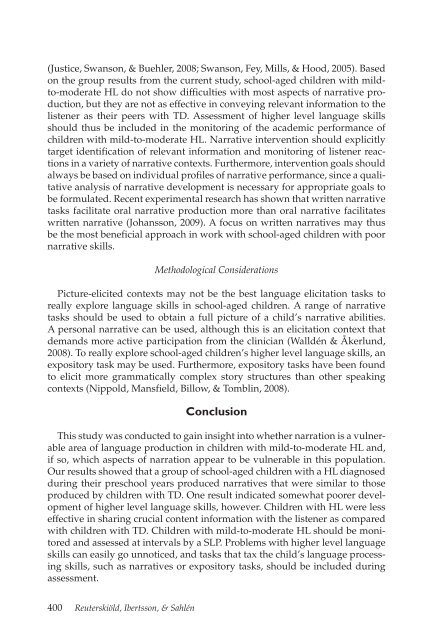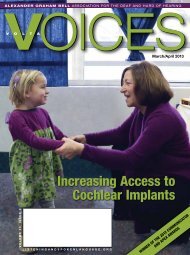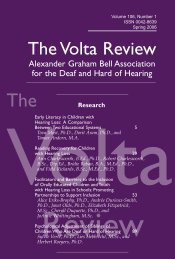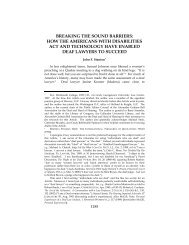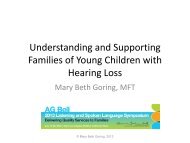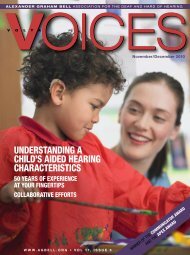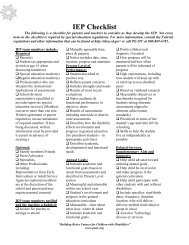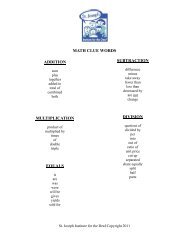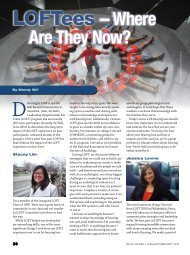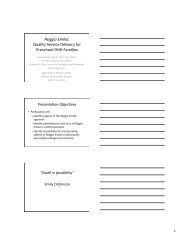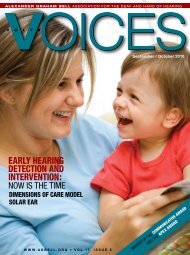Download this issue - Alexander Graham Bell Association
Download this issue - Alexander Graham Bell Association
Download this issue - Alexander Graham Bell Association
You also want an ePaper? Increase the reach of your titles
YUMPU automatically turns print PDFs into web optimized ePapers that Google loves.
(Justice, Swanson, & Buehler, 2008; Swanson, Fey, Mills, & Hood, 2005). Based<br />
on the group results from the current study, school-aged children with mildto-moderate<br />
HL do not show difficulties with most aspects of narrative production,<br />
but they are not as effective in conveying relevant information to the<br />
listener as their peers with TD. Assessment of higher level language skills<br />
should thus be included in the monitoring of the academic performance of<br />
children with mild-to-moderate HL. Narrative intervention should explicitly<br />
target identification of relevant information and monitoring of listener reactions<br />
in a variety of narrative contexts. Furthermore, intervention goals should<br />
always be based on individual profiles of narrative performance, since a qualitative<br />
analysis of narrative development is necessary for appropriate goals to<br />
be formulated. Recent experimental research has shown that written narrative<br />
tasks facilitate oral narrative production more than oral narrative facilitates<br />
written narrative (Johansson, 2009). A focus on written narratives may thus<br />
be the most beneficial approach in work with school-aged children with poor<br />
narrative skills.<br />
Methodological Considerations<br />
Picture-elicited contexts may not be the best language elicitation tasks to<br />
really explore language skills in school-aged children. A range of narrative<br />
tasks should be used to obtain a full picture of a child’s narrative abilities.<br />
A personal narrative can be used, although <strong>this</strong> is an elicitation context that<br />
demands more active participation from the clinician (Walldén & Åkerlund,<br />
2008). To really explore school-aged children’s higher level language skills, an<br />
expository task may be used. Furthermore, expository tasks have been found<br />
to elicit more grammatically complex story structures than other speaking<br />
contexts (Nippold, Mansfield, Billow, & Tomblin, 2008).<br />
Conclusion<br />
This study was conducted to gain insight into whether narration is a vulnerable<br />
area of language production in children with mild-to-moderate HL and,<br />
if so, which aspects of narration appear to be vulnerable in <strong>this</strong> population.<br />
Our results showed that a group of school-aged children with a HL diagnosed<br />
during their preschool years produced narratives that were similar to those<br />
produced by children with TD. One result indicated somewhat poorer development<br />
of higher level language skills, however. Children with HL were less<br />
effective in sharing crucial content information with the listener as compared<br />
with children with TD. Children with mild-to-moderate HL should be monitored<br />
and assessed at intervals by a SLP. Problems with higher level language<br />
skills can easily go unnoticed, and tasks that tax the child’s language processing<br />
skills, such as narratives or expository tasks, should be included during<br />
assessment.<br />
400 Reuterskiöld, Ibertsson, & Sahlén


